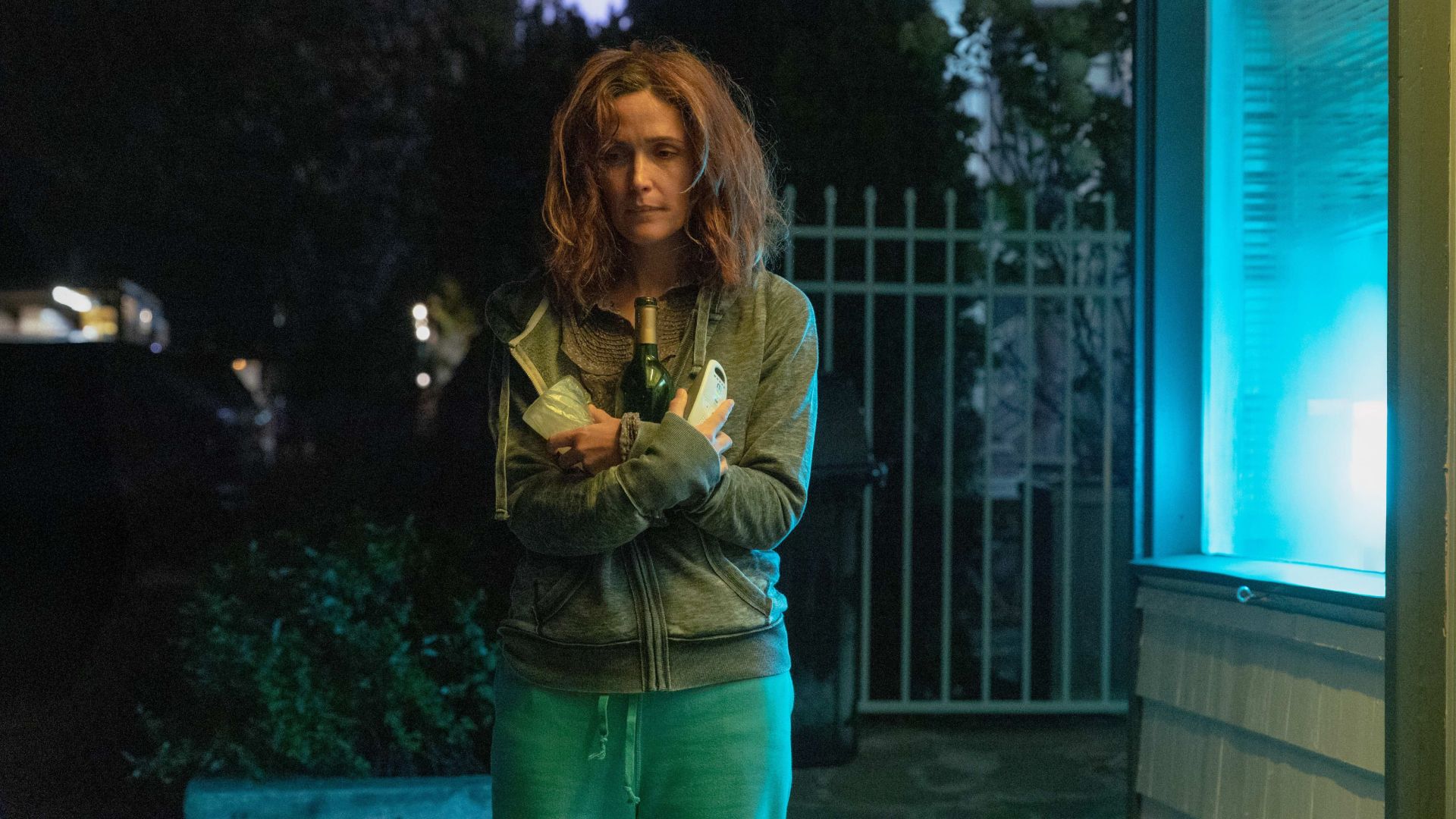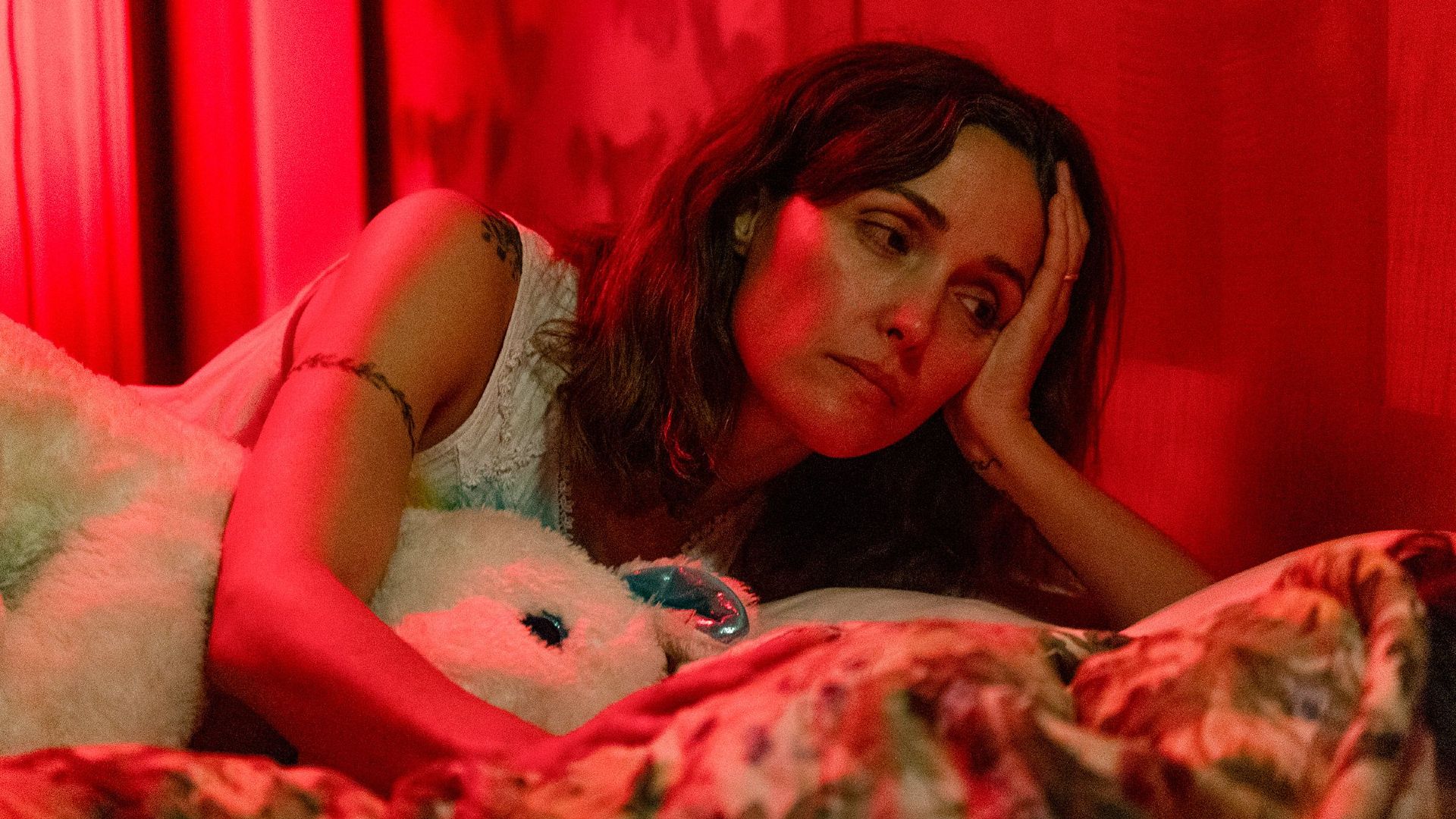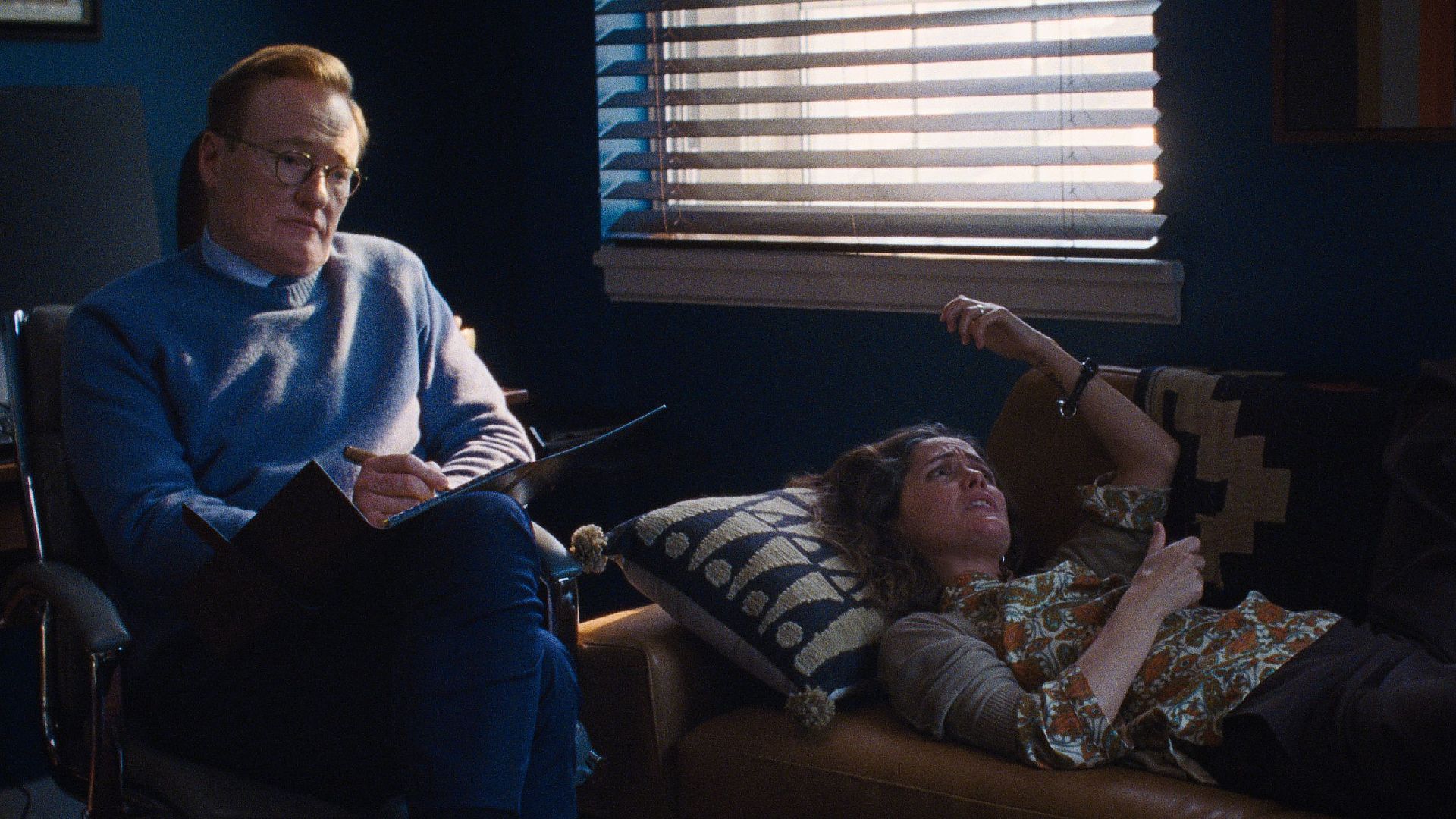
I was so excited to finally see Mary Bronstein’s new film, If I Had Legs I’d Kick You, after loving her first feature, Yeast, way back when (and discovering a young Greta Gerwig in it!). It was definitely worth the 17-year wait. Rose Byrne is absolutely incredible – a truly phenomenal performance. Plus, the movie has some amazing supporting roles from Conan O’Brien and A$AP Rocky. Honestly, it’s already become one of my favorite films of 2025. It’s a really gripping, darkly funny, and surprisingly relatable story about a woman completely at her wit’s end. I couldn’t look away!
Before the movie opens in theaters across the country this weekend, I had a chance to talk with Bronstein about her break from directing, how she convinced Conan O’Brien to take on a real acting role, and why audiences will connect with Rose Byrne’s character’s struggles.
I instantly connected with this movie when Rose Byrne playfully stuffed a handful of pizza cheese into her mouth.
Mary Bronstein: I love that.
It’s been 17 years since your directorial debut, Yeast. What took so long?
I first showed my film, *Yeast*, at the SXSW festival in Austin. Back then, Matt Dentler, the festival programmer, championed films like mine, which wouldn’t get a chance at a festival like that today. But audiences weren’t quite ready for it. I had a difficult experience with the reactions to the film, particularly because filmmaking and festivals were, and still are, largely dominated by men. In the independent film world, this was especially true. I felt unwelcome and like there wasn’t a place for me, and that experience made me question whether I could even continue making movies.
Where do you think that hostility came from?
Bronstein explained that the negative reaction to her film stemmed from the fact it was boldly and unapologetically created by a woman who didn’t cater to anyone’s expectations. This led her to step away from filmmaking – a decision she doesn’t regret, as it allowed her to develop her current artistic voice. She pursued graduate studies, earning a degree in psychology, and worked as a play therapist in New York City hospitals. After having a child, she focused on academic writing, particularly feminist theory. However, when her daughter became ill, she experienced a personal crisis. She devoted herself entirely to her daughter’s care, feeling as though she was losing herself in the process, and now wonders what will happen when her daughter recovers – what will *she* do then?
I recently had a moment of self-reflection and realized what truly defines me: I’m a creative person – an artist, filmmaker, and writer. Making films is how I express myself, and that’s how this project began. It took longer than expected, but it felt like the right moment to bring it to life.
I have a theory that if you try to make something for everyone, you’re making something for nobody.
Interestingly, audiences seem receptive to the film *Yeast* right now. It’s currently showing in theaters both nationally and internationally, and was also available on the Criterion Channel. While progress on female representation in film hasn’t improved, there’s a current mood of anger and frustration, and people are connecting with *Yeast* because it taps into that raw emotion and aggression. It’s been really encouraging to see that response.
What I also want to emphasize is that truly great films come from real-life experience. You need to have lived and actively engaged with the world. I often see filmmakers who’ve spent their lives watching movies, gone to film school, and then immediately start making films. But often, what are they actually making a film *about*? It ends up being a film about filmmaking itself, lacking deeper substance.
We’re in an era where a lot of our media is extremely referential.
Honestly, as a viewer – and as a filmmaker – I’m just craving originality. At 46, I’ve seen *so* many movies and TV shows, and I’m frankly tired of seeing things that just rehash what’s already been done. If I want Kubrick, I’ll watch Kubrick! I want to know what *you*, the filmmaker, have to say. All those films I’ve seen are part of me now, and sure, they’ll naturally influence my work, and that’s fine. But the real thrill would be if someone watched something I made and said it reminded them of something else, and I could honestly say, ‘Yeah, that was just a natural echo.’ It reminds me of what Orson Welles said back in the ’50s – and that was *before* we had decades and decades of cinematic history to draw from – that the worst thing to happen to filmmaking is the obsession with homage.
It also feels like people are missing the bigger picture, and I think about this often. Especially with tools like ChatGPT becoming so common – it doesn’t really *have* a point of view.
Bronstein: It’s not alive. It doesn’t have a brain.

A24
Your film clearly presents a unique point of view, and it’s impressive how it manages to connect with a broad audience, even those who haven’t experienced the specific situation it portrays. While I don’t have children, watching ‘If I Had Legs I’d Kick You’ felt incredibly resonant as someone who struggles with anxiety – it was like seeing my own internal experience reflected on screen.
I believe that trying to appeal to everyone ultimately appeals to no one. It seems strange, but the more focused and specific a story is, the more universally relatable it becomes. People connect with the emotions, and everyone has experienced feeling overwhelmed or going through a tough time. Who hasn’t questioned their own sanity during a crisis, or felt like the world was against them? Who hasn’t needed a break? I’ve been surprised and thrilled by how many people – even those without children, and people of all ages and backgrounds – have connected with my work. It’s rewarding because the core of the story is about a mother dealing with a uniquely difficult situation – a seriously ill child. This isn’t a typical motherhood story; it’s about navigating an extraordinary challenge.
When Linda says, “This is not how it was supposed to be,” it feels so visceral.
Exactly, and that’s part of her thing. It’s not fair. This is not fair.
I often find myself questioning why things keep going wrong, especially when I’m already struggling. I’ve talked about it with my therapist too – it feels like a curse, or like the world is deliberately making things harder for me. It always happens when I’m at my lowest point, completely drained, and then something small – like a flat tire – just feels like the last straw.
This movie captures that feeling of being overwhelmed. It’s about how seemingly small frustrations can feel just as intense as major life problems. The character Linda gets equally upset about a parking attendant, her child being sick, not being able to buy wine, or her husband going to a baseball game – everything feels equally stressful. The core issue is actually her daughter, but it’s easy to get caught up in all the little things. It’s like when everything is already going wrong, and then something minor happens – like your pencil breaking – and you completely lose it. The pencil isn’t the real problem, it’s just the last straw.
She’s too caught up in her own problems to recognize them. It’s interesting how her therapy sessions with patients mirror her own therapy – her therapist, played by Conan O’Brien, keeps pointing out the same things she’d tell others, but she refuses to apply that advice to herself. She just doesn’t seem to make the connection.
She repeats the same unhelpful advice she finds frustrating in others. The conversation goes around in circles, like a spiral, and she doesn’t seem to realize it. It’s left to the audience to notice this pattern, and I’m glad you did. It’s similar to telling someone who’s upset to ‘calm down’ or suggesting they ‘just get some sleep’ – things that aren’t actually helpful. And then she does the same thing to her patients. It’s a common human tendency.
It’s when everything is falling apart, and then a small annoyance – like a broken pencil – pushes you over the edge, causing you to completely lose your temper. But the real frustration isn’t actually about the pencil itself.
I have to ask you about casting Conan O’Brien, who is just so damn good in this.
Bronstein: Isn’t he amazing? He’s incredible.
Did you already know him? How did you manage to get him?
I hadn’t met this actor before we started working together, but we’ve become friends, which is amazing considering I’ve been a fan of his since I was a teenager when his first show came out. I specifically didn’t want to portray the therapist as the typical, stereotypical figure – you know, the one with the cardigan and scruffy beard. That’s how therapists are usually shown, and that’s never been my experience. I wanted something fresh, and the way his character develops in the story is intentionally different from how therapy is usually depicted in movies.
I was listening to a podcast where Conan O’Brien interviewed David Letterman, and it struck me how much both of them influenced my sense of humor growing up. Their voices are just really comforting to me – I’ve been listening to them for decades. That’s when I thought Conan would be perfect for a role in our movie. I sent him the script, and to my surprise, he said yes, even though he’d never acted before and wasn’t sure he could pull it off. I encouraged him to try, and we went for it. It was a bit of a gamble, as he pointed out, but I had a feeling he’d be great, and he was! I want people to understand this wasn’t just a quick cameo; Conan delivers a genuine, strong performance – truly as good as, or even better than, anything else he’s done.

A24
Similarly impressive is the cinematography, the really close shots of Rose Byrne’s face.
Bronstein: Her face is incredible.
I enjoy watching her eat, and I find it oddly comforting to see her relaxed and lost in her own world – whether she’s listening to music or just zoning out. It’s something a lot of people can probably understand.
Bronstein said, “Seriously, get some headphones.” Then she admitted she couldn’t because she lost hers while she was high.
Just trying to have, like, five minutes…
Bronstein: Five minutes to yourself, absolutely. You get it.
I’m really struck by the choice to keep Linda’s daughter mostly hidden – we only catch quick glimpses of her, like a bit of hair or a shoulder. I think it’s a really effective storytelling technique.
From the beginning, I wanted this film to be told entirely from Linda’s perspective. We only see and feel what she does, and it doesn’t matter if what she’s experiencing is actually real or not – it’s real *to her*, and we have to accept that. The film never leaves Linda’s presence; we’re always with her, experiencing things as she does. Regarding her daughter, I envisioned Linda being unable to see her as a normal child she could enjoy or connect with. Instead, she views her daughter as part of a larger, hostile force working against her. She sees her daughter as a burden, a source of frustration, and something that’s consuming her. She simply can’t *see* her daughter as a person. I initially portrayed this inability figuratively, but then I decided to make it literal – if Linda can’t see her daughter, then *we* as the audience shouldn’t either.
Beyond the emotional aspect, there’s a technical reason for delaying the introduction of a child in the film. Linda’s actions could be disturbing to parents, and I wanted to ensure the audience remained focused on her perspective. By not showing a child initially, we avoid immediately directing sympathy towards them – it’s a natural human response – and keep the viewer connected to Linda’s journey, regardless of her choices. This was a deliberate creative decision.
I’ve noticed people are comparing ‘If I Had Legs I’d Kick You’ to ‘Uncut Gems,’ and I’m curious how you feel about that. Given that your husband, Ronald Bronstein, co-wrote and produced ‘Uncut Gems,’ does it feel like a fair comparison when you hear it?
These two films don’t really have anything in common story-wise, except that they both create a sense of tension and stress for the audience. It’s interesting because we’re used to seeing heroes who make good choices, but these movies flip that expectation, making viewers feel uneasy. I met my colleague Ronnie while working on *Frownland*, and we share a similar artistic vision, which probably explains the comparison. Beyond that, it’s a bit of an odd pairing. I’m happy with the connection, though, because I’m proud of *Frownland* and the work Josh and Ronnie did. I also think there aren’t many films focused on female characters that people can really relate to, and that contributes to the comparison as well.
The movie I thought about while watching your film is We Need to Talk About Kevin.
Bronstein: Oh, yes!
It struck me how groundbreaking that film seemed when it came out, and your film feels just as revolutionary. It’s unsettling to realize so little has improved in the last fourteen years.
Bronstein mentioned that even in 2025, the film *We Need to Talk About Kevin* still feels impactful. He specifically highlighted the scene where Tilda Swinton’s character is overwhelmed by her baby’s crying and seeks refuge at a construction site, calling it a powerful moment. He expressed surprise that no one had mentioned the movie to him recently, adding that he’s a big fan.
Read More
- Clash Royale Best Boss Bandit Champion decks
- Mobile Legends: Bang Bang (MLBB) Sora Guide: Best Build, Emblem and Gameplay Tips
- Best Hero Card Decks in Clash Royale
- Vampire’s Fall 2 redeem codes and how to use them (June 2025)
- Best Arena 9 Decks in Clast Royale
- All Brawl Stars Brawliday Rewards For 2025
- Clash Royale Furnace Evolution best decks guide
- Clash Royale Witch Evolution best decks guide
- Dawn Watch: Survival gift codes and how to use them (October 2025)
- Brawl Stars December 2025 Brawl Talk: Two New Brawlers, Buffie, Vault, New Skins, Game Modes, and more
2025-10-17 21:20